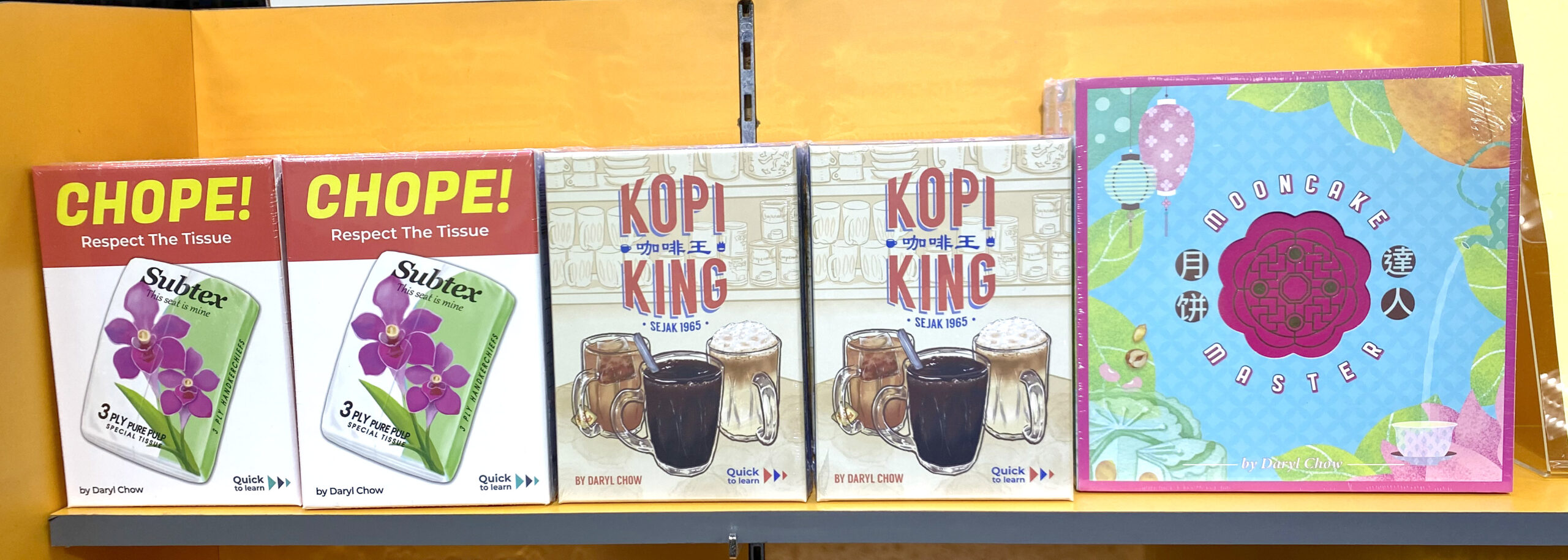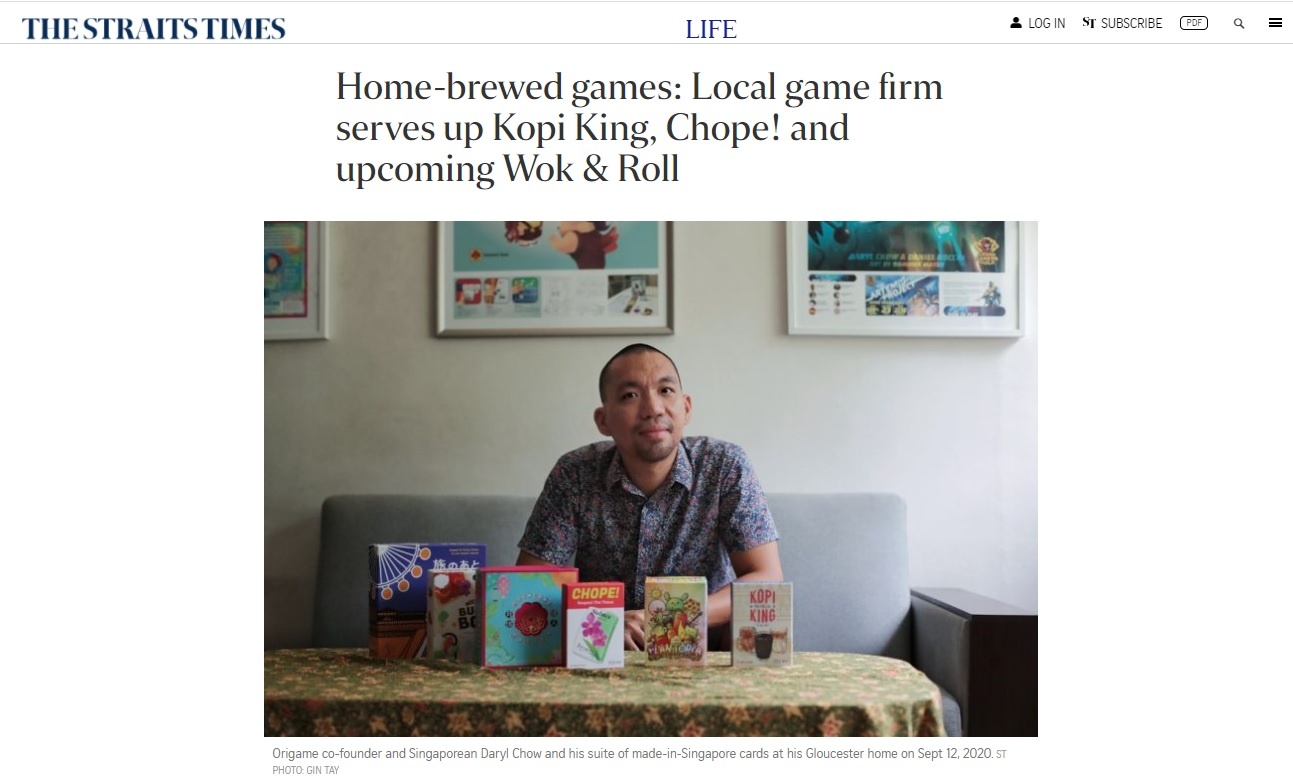Hey PI-fans,
It’s almost the weekend once again! We had the pleasure to have an E-mail interview with rock star Singaporean game designer, Daryl Chow! Daryl has created many local games like Chope! Kopi King, Mooncake Master and is working on releasing Plantopia soon! Read on to find out what makes him tick and what he loves most about designing games!
Q: When did you first start playing Board Games and what sparked that interest in making your own games?
Looking back, I’ve been playing board games my whole life. I played Chinese Chess in school competitively, then I joined the Bridge club where I was very involved as well. Settlers of Catan and the ability to upgrade to Cities and Knights as well as Agricola were the first few games that really got me into the hobby almost 20 years ago now. After joining the gaming scene in Ottawa, Canada, I met some friends who met weekly who created their own game prototypes and I was captivated by the process of thinking of and making games and joined them religiously.
Q: You must like food a lot telling by the number of food games you’ve made! How do you pick and choose ideas that would make good games?
We didn’t intentionally set out to make that many food games, but somehow it happened. But this is for good reason – food is intrinsically linked to culture, and at Origame our core philosophy is to make games about Asian culture. I believe that if you use themes that are meaningful to you, people can feel it when they play the games, and the converse is also true. In my personal process of creating games, themes and mechanics go hand-in-hand, so if you have interesting mechanics that jive with interesting themes, you have the beginnings of a ‘good’ game.
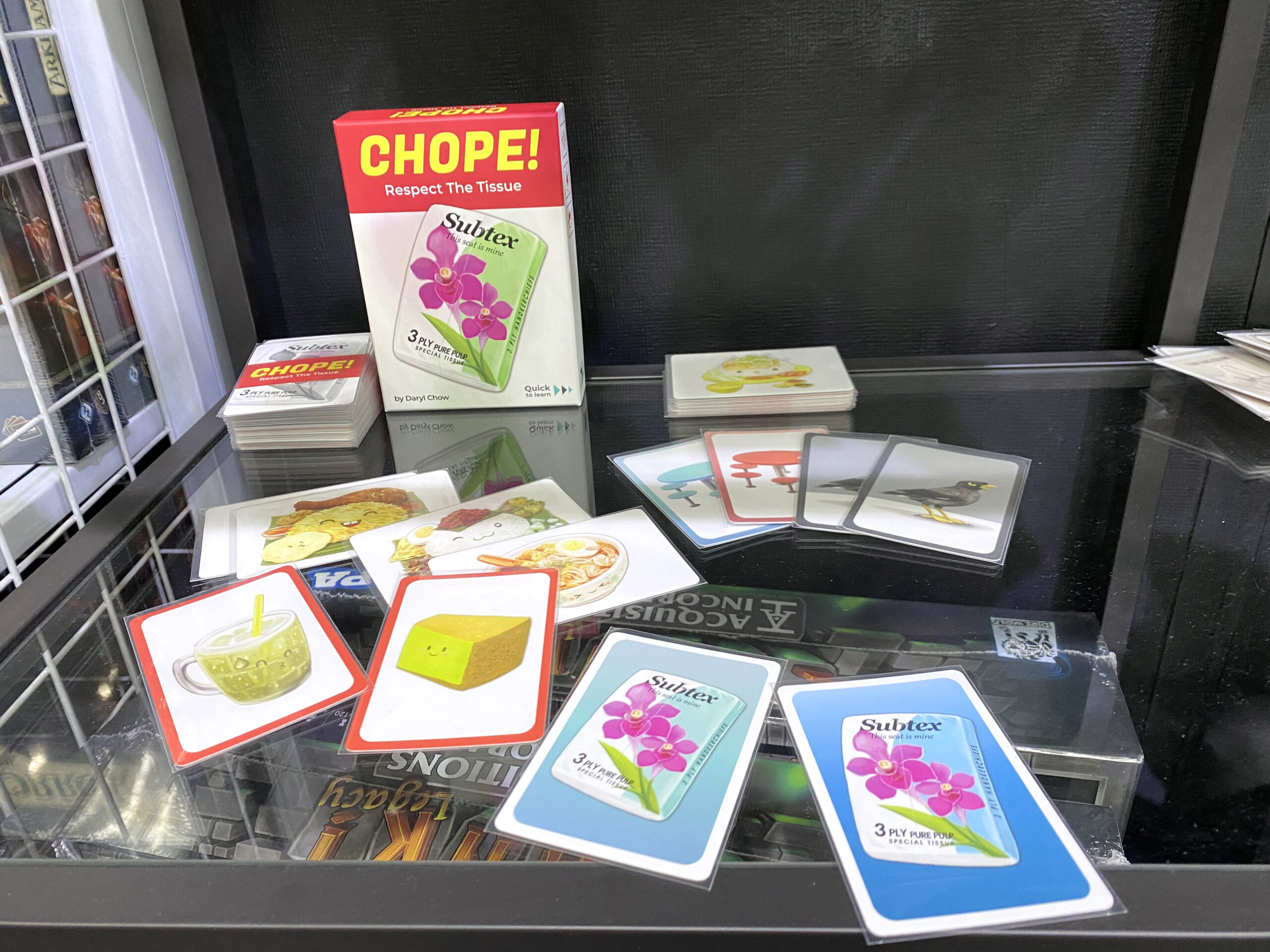
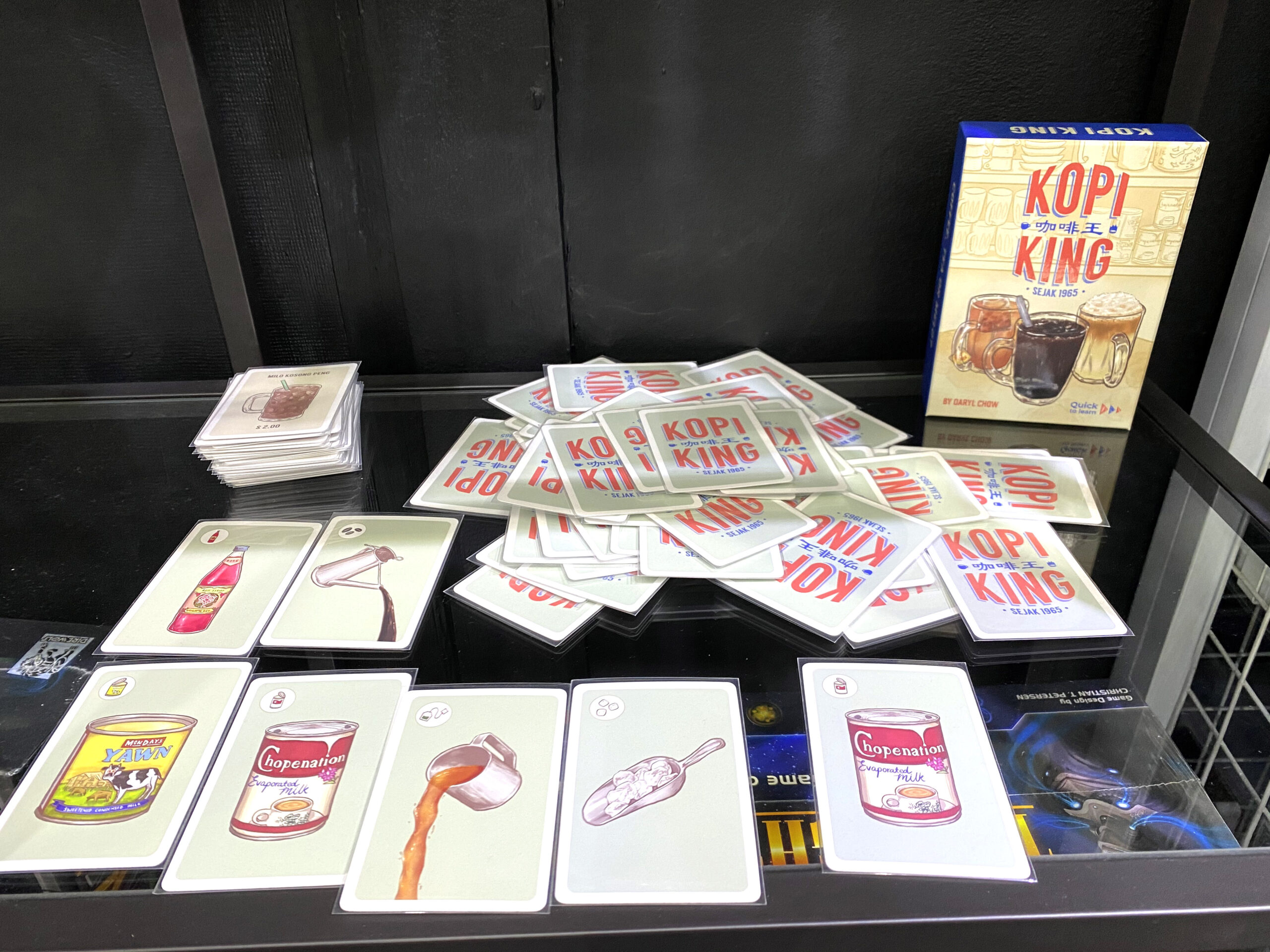
Q: What game mechanics in particular do you like?
I don’t shy away from any mechanic and try to force myself to step out of my comfort zone but I do personally enjoy and am comforted by the classic Euro mechanics such as worker/dice placement and resource management. Lately, I’ve been focusing on mechanics that introduce more player interaction as well as reducing downtime.
Q: Since you’ve made many games, the process from idea to development and production would feel like second nature to you. What’s your favourite part of the project process?
I do enjoy the entire process thoroughly and so there’s technically no favourites. But there’s something to be said about the ‘aha’ moments that makes the entire concept come together that feel really satisfying. Also, I much prefer early stage testing to late stage testing, because in earlier stages the games still feel like they brim with untapped potential.
Q: Could you share any interesting anecdotes that surprised you while working on a game?
There are two types of moments for me when it feels like the stars align – first when I find mechanics that fit themes perfectly, and second when the math dovetails nicely and the numbers fit perfectly. An example is when designing Overbooked, I realized that the grid for an airplane fit tetrominoes perfectly, and there were exactly 10 columns across. Recently when conceptualizing our upcoming game about Peranakan tiles, I also encountered a situation where the numbers were startlingly symmetrical and the math literally designed the game by itself.
Q: What interesting observations have you made during playtesting with the local Singapore crowd compared to overseas like the West and East Asia?
This is a great question and probably not asked enough! In Singapore, as in Asia generally, designers in general still haven’t played enough games, but what holds them back is the concern about the product and not about the process. In Canada, many designers test ideas just for the sake of testing ideas, and as a result the designer and the playtesters grow in knowledge and experience. In Japan and Taiwan in particular, I also encountered many games that pushed the boundaries of what we perceive are standard mechanics. In all honesty, individual games aren’t as important as your overall journey as a designer, so it’s very important to just keep churning out different concepts, testing limits and trying exciting new things as opposed to flogging a dead horse.
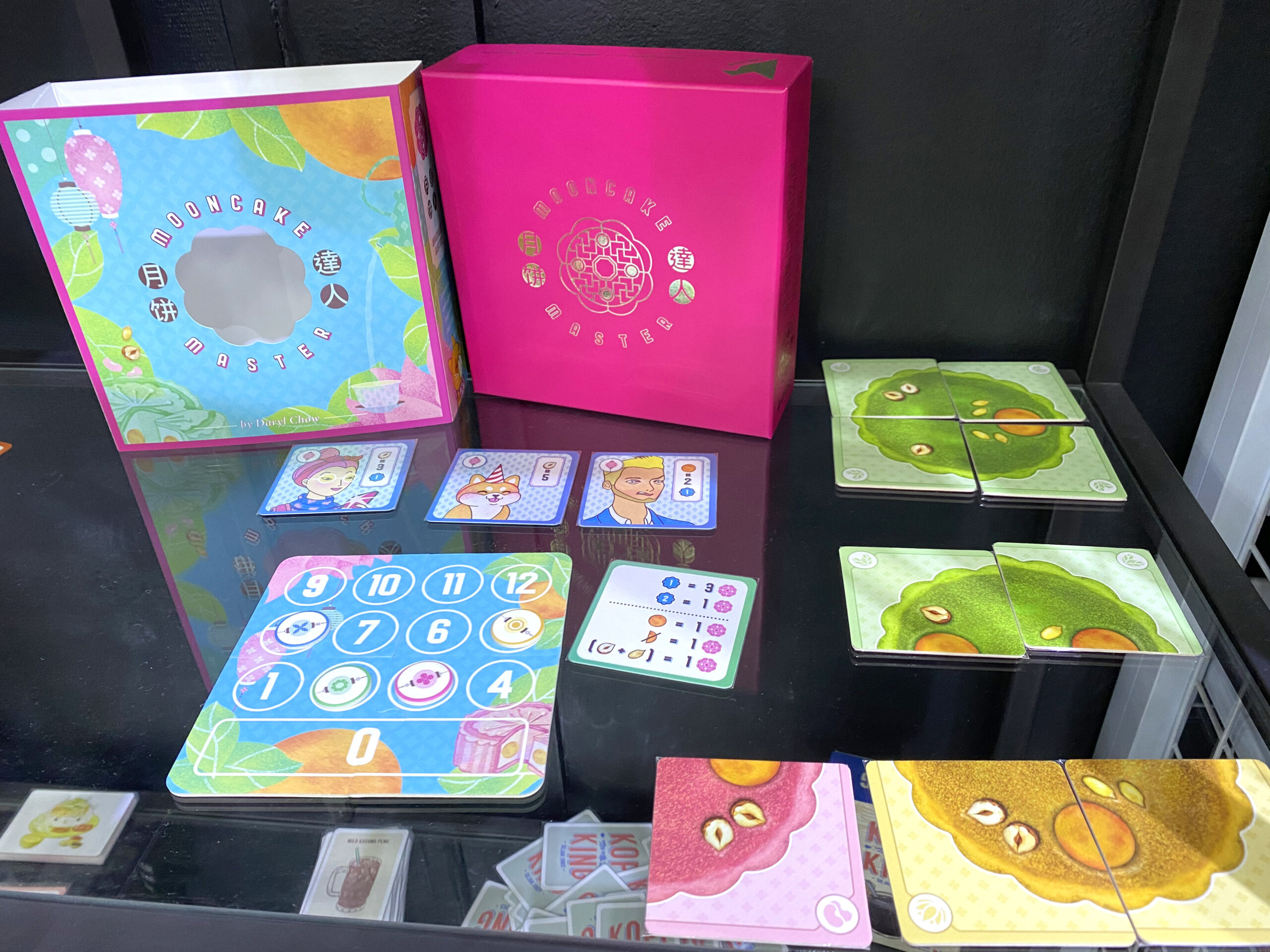
Q: As you’ve mentioned in previous interviews, awareness of board games is an issue in Singapore. Would you say it’s getting better now with the SGAG games hitting the mainstream and young people being more aware thanks to influencers?
There’s nowhere to go but up, and yes, young people are a key demographic as they have a lot of spare time and board games are an excellent way to socialize. But one important demographic that is gaining ground and that is possibly even more crucial than young folks are young families. I believe that board games are an excellent social tool for any age, and to really get games to become mainstream board games have to be a mainstay at family gatherings as a fun activity that includes everyone. As a bonus, kids will grow up with board games as an integral part of their lives and that turbocharges their mental and social growth.
Q: It seems more Singaporeans are taking to designing board games! What would you like to see happen in the board games scene in Singapore?
I think this is a natural development as more people get into the hobby, and yes it’s always good to get new talent in! I would be ecstatic if in Singapore, the board game scene approaches that of what it is in Germany currently, where families and friends pay attention to games as they do to other forms of entertainment and culture such as movies and music. Board games, especially well-designed and well-produced ones, impart the players with deep and engaging experiences and memories, so I don’t see why it can’t be part of popular culture.
Q: Could you tell us more about how Origame came to be and where do you see it going?
Origame was started in 2019 when me and my co-founder Nick Pang decided that there needed to be a stronger voice for Asian games. We believe that there are so many interesting untapped themes and stories from Asia out there that really need a voice, while most Western publishers are rehashing the same cowboy/space/zombie etc themes over and over again. Our earlier games have been simpler games but already with Plantopia and Wok and Roll, we’re starting to roll out more challenging and ‘thinkier’ games which are actually more of my own personal design style. Next up, we’re planning to delve into different aspects of our culture and history, from an assortment of topics ranging from Peranakan tiles to the spice trade, and also our rich biodiversity. And we’re gaining invaluable experience with each game we produce, so we hope to bring even better games to your tables as we go along.
Q: Lastly, what is your favourite Kopitiam drink and hawker dish!
Chope!


In Singapore, everyone knows the ‘Laws of Chope’, basically ‘hawker table reservation etiquette.’ If you see a packet of tissue placed on a hawker table seat, it means its reserved. As every Singaporean knows, reserving hawker table seats is a game of ‘faster choper first’: you don’t slap that tissue packet down, you don’t get that hawker seat.
In ‘Chope!’, players are hungry folks trying to get their favourite hawker delights and find a table. On your turn, flip open as many cards from the centre hawker deck to see how much food cards you can get. There’s Chicken Rice, Nasi Briyani, Nasi Lemak, Laksa to name a few. If you encounter 2 of the same food cards, you bust! You’ll be forced to pick that one dish and discard all the others! Meanwhile, if other players see table cards while you’re flipping open cards, they slap down a tissue pack card on the table card and yell ‘CHOPE!’ to snag a table! There are also Mynah birds that pop up in the deck and players have to play ‘SIAM!’ cards and yell SIAM! to scare the birds away! The player who scores the most food cards and choped tables when the deck runs out, wins!
A fast-paced family game full of local Singaporean delight that’s great with everyone from kids to seniors!
For 3-6 Players, 20 Minutes Playing Time, Age 6+
Kopi King
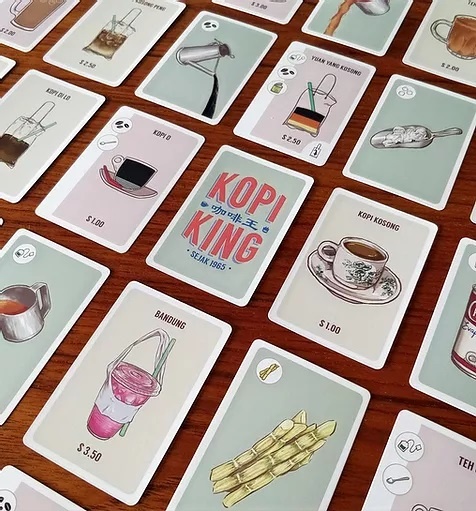
Mooncake Master



The Chinese Mid-Autumn Festival takes place around mid-September to early October every year. And the best part: the mooncakes! You and your friends are mooncake apprentices with the aim to craft the tastiest mooncakes and cater to fussy customers.
Players each select mooncake tile cards by choosing 1 of 3 tiles and passing 1 to the left and 1 to the right. When everyone’s done selecting, they reveal their tiles and try to make mooncakes with other players by fitting their cards into 4 squares. 4 squares make a complete mooncake. There’s lotus seed paste, red bean paste, green tea paste, salted egg yolk to name a few. After everyone has made 3 complete mooncakes, they’re scored by taste. If you made good combinations, that mooncake gets higher taste points! eg. 1 flavour mooncakes, 1 complete salted egg yolk. But it’s not just about making tasty mooncakes, there are customers to fulfill! Gain additional points by fulfilling customers’ demands. Player with the most customers fulfilled wins!
A delightful game to play with friends and family over tea and samplings of mooncakes!
For 1-6 Players, 30 Minutes Playing Time, Age 10+

